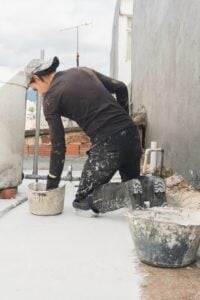Understanding Different Waterproofing Products and How to Use Them
Table of Contents
ToggleFor New England homeowners, property managers, and builders, water intrusion is an inconvenience and a persistent enemy. Damp basements, peeling paint, or that musty smell creeping up from below can signal that moisture is slowly eating away at the structure. Choosing the right waterproofing products or solution can be confusing, especially with so many products on the market, each promising lasting protection. Keep reading to learn about the right materials and methods that truly work for your home’s specific conditions.
Significance of Waterproofing
Waterproofing preserves the structural integrity of your property. Once moisture seeps into a foundation wall, it can trigger concrete deterioration, mold growth, and even health issues from poor indoor air quality. In regions like Massachusetts and New Hampshire, where spring melt and heavy rain meet cold winters, concrete naturally expands and contracts.
Without proper sealing, small cracks can become water channels. Choosing the right waterproofing product helps prevent this cycle before it causes lasting damage.
Types of Waterproofing Products and Where They Work Best
1. Cementitious Waterproofing
Cementitious coatings are among the simplest and most commonly used materials for interior and exterior walls. They’re applied like paint and bond well to concrete and masonry.
Best for: Basements, water tanks, and foundations with minimal movement.
While easy to apply, these coatings are rigid once cured, meaning they can’t handle significant foundation shifts or cracks caused by freeze-thaw cycles.
2. Liquid Waterproofing Membranes
Liquid-applied membranes create a flexible, seamless barrier over the surface. Once cured, they form a rubber-like coating that prevents water penetration.
Best for: Below-grade walls, decks, and surfaces exposed to mild structural movement.
In New England’s fluctuating temperatures, flexibility is key, making liquid membranes a strong option for lasting protection.
3. Bituminous Coatings and Membranes
Bituminous materials (also known as asphalt-based) are popular for their durability and water resistance. They’re used on both foundations and roofing systems.
Best for: Foundations with consistent soil contact and areas that need high water resistance.
However, they can break down under prolonged UV exposure, so they’re typically used below ground level.
4. Polyurethane Liquid Membranes
Polyurethane coatings offer strong flexibility, durability, and adhesion to concrete, making them ideal for complex or high-moisture areas.
Best for: Flat roofs, basements, and retaining walls. They can bridge small cracks and provide long-lasting protection, a must in areas prone to heavy rainfall or hydrostatic pressure.
5. Crystalline Waterproofing
This system works from within the concrete. When applied, chemicals penetrate deep into the surface and form crystals that block pores and capillaries.
Best for: New concrete construction or active water leak prevention on older surfaces. Crystalline waterproofing is self-sealing, meaning it can reactivate when new moisture enters, offering ongoing protection.
6. Matching the Product to the Problem
Choosing a waterproofing products involve understanding where and why the water is entering. For example:
- A damp basement corner after every storm may require urethane injection rather than surface coating.
- A concrete wall in constant soil contact may need bituminous or crystalline solutions for deeper penetration.
- Decorative masonry exposed to the elements might benefit from clear sealers that protect without changing appearance.
Every product has a purpose, but none work effectively if the underlying issue, such as poor drainage or hydrostatic pressure, isn’t addressed.
Why Professional Assessment Makes All the Difference
Waterproofing is one of those areas where product choice, preparation, and technique determine success. Many property owners invest in store-bought sealers only to see leaks return months later. Professional technicians know how to evaluate soil conditions, foundation material, and crack behavior before selecting the right treatment.
A qualified team will also apply coatings or injections using specialized tools that ensure proper adhesion, thickness, and penetration, something nearly impossible to achieve with DIY methods.
Long-Term Value of Proper Waterproofing
Beyond peace of mind, effective waterproofing extends the lifespan of your foundation, lowers humidity, and increases property value. It’s a one-time investment that prevents thousands in future repairs and maintains the structural health of your home or building.
If you require professional basement waterproofing services, don’t hesitate to book an appointment with Crack X. Our specialists will inspect your property and provide the best solution and advice regarding basement finishing. Call us at (877) 727-2259. We are a civil structures repair company operating in Maine, Massachusetts, and New Hampshire.
FAQs
What is the most effective waterproofing method?
The most effective method depends on the structure and environment. For most foundations, a combination of urethane injections and membrane coatings provides long-term, flexible protection against water intrusion.
Can waterproofing stop existing leaks?
Yes, professional injection systems and crystalline products can seal active leaks by creating a watertight barrier from within the wall.
How long does waterproofing last?
High-quality waterproofing, when professionally applied, can last decades. Routine inspection ensures the coating or membrane continues to perform as intended.

